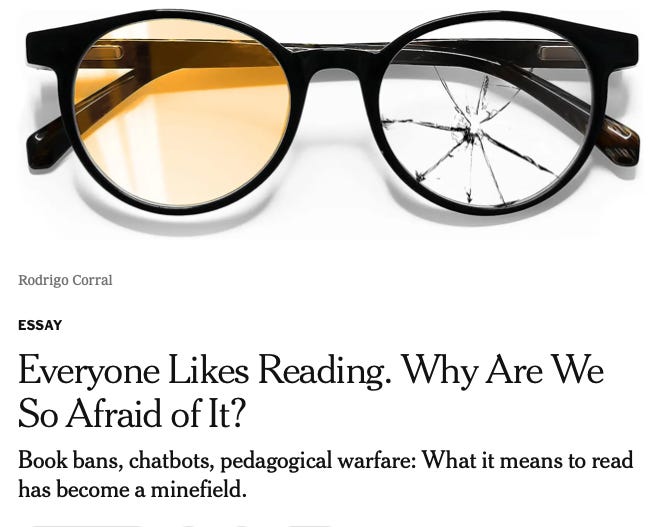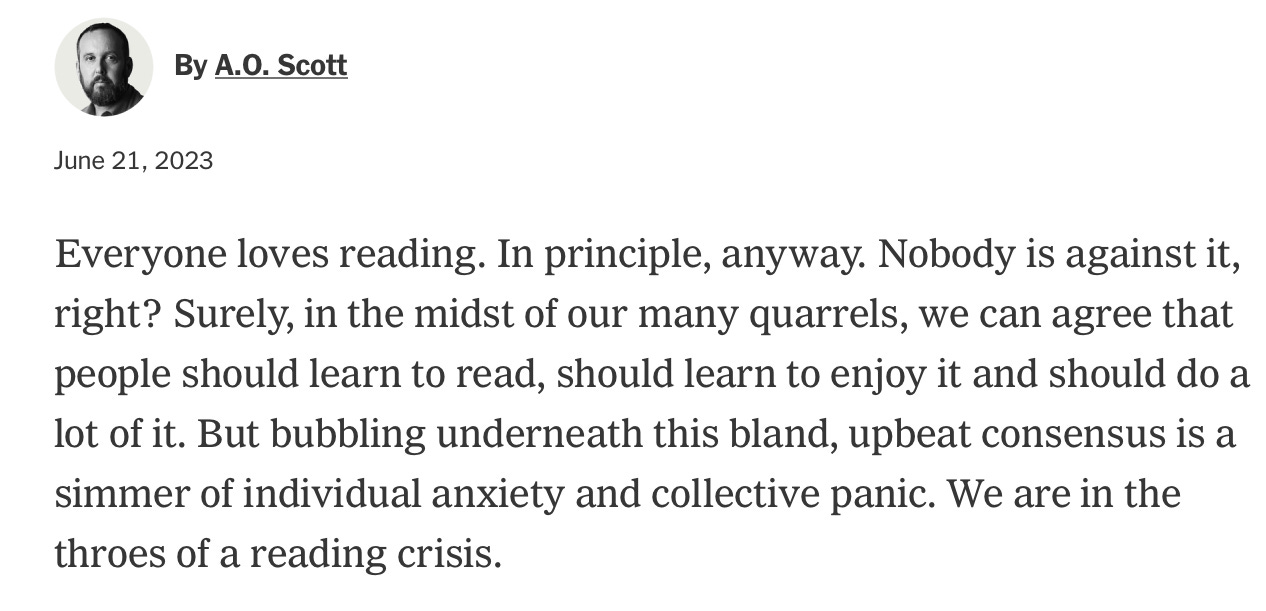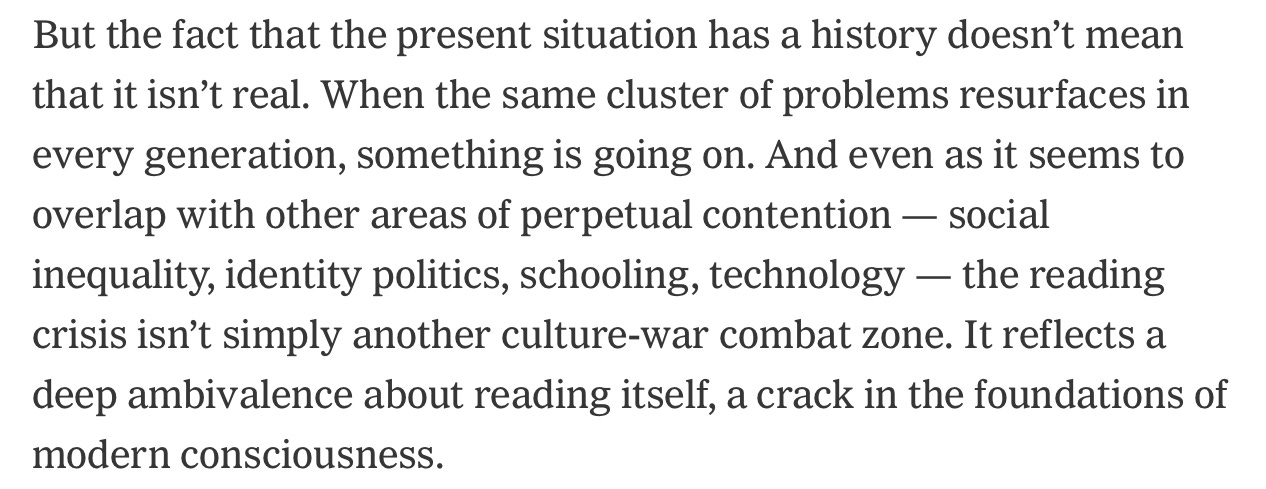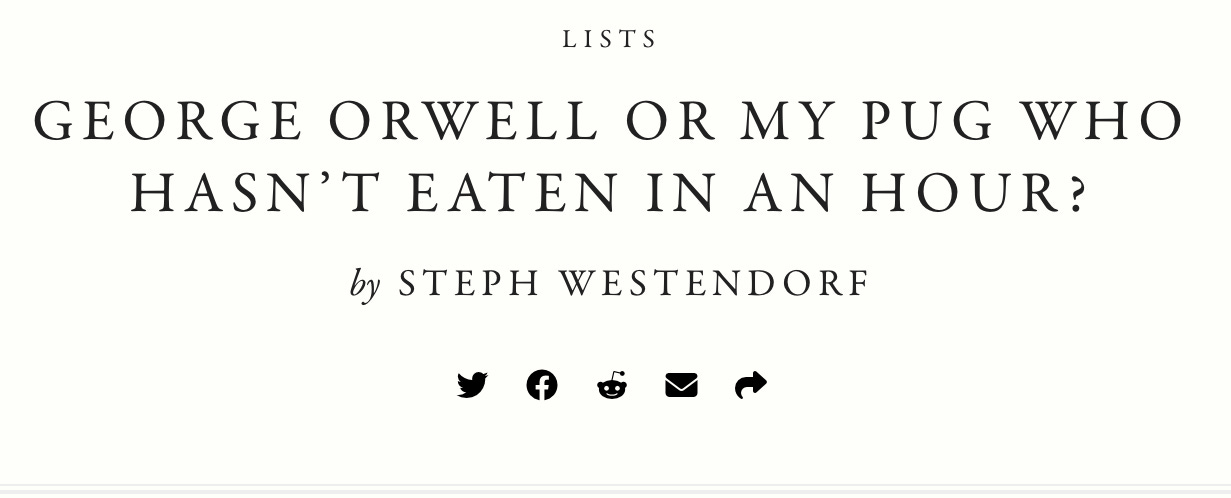A.O. Scott (who I understand goes by Tony), the former film critic for the New York Times, has recently returned to his original home in the books section of the paper and dropped a big think piece this week on what he calls a “reading crisis.”
(That link is a gift, so non-subscribers to the paper can read it for themselves.)
I’ve enjoyed Scott’s writing for years, not necessarily always agreeing with his takes, but feeling smarter for having been exposed to them.
The piece on the reading crisis, unfortunately, is a dud.
It’s okay. It happens. Lord knows it’s happened to me, though I have the luxury of burying my duds on my own hard drive, rather than having to put them in the pages of the New York Times.
The problem, from my perspective, is the attempt to frame a disparate list of events under the rubric of a single shared crisis that is rooted in reading.
As someone who attempts to tie together individual threads into a larger whole myself, I understand the impulse, but having declared a crisis, Scott is now required to prove his thesis and the proof of a grand crisis is lacking.
He cites the many attempts from the right to restrict access to books in schools and public libraries and then because there is apparently some kind of institutional requirement at the Times to create a false balance between political sides, notes that the left is engaging in “censorious piety on social media and college campuses” as though this is the same thing. (It is not.) He closes with an example from Utah where, in protest to the right wing overreach, someone is trying to get the Bible removed, which in terms of his own chain of argument and evidence is a non-sequitur, but if we’re not paying attention, does allow us to shake our heads in sad agreement at the distressing state of the world.
So far, Scott is working on vibes, and it gets worse when he yokes the so-called “reading wars” into part of this broader crisis. (The nonsense that’s been perpetrated in the name of supposedly helping children learn to read could fill it’s own post someday, and maybe it will.)
Fewer students are majoring in English - true, but this has nothing to do with reading - and there’s also TikTok, which is more popular than reading, and oh, here comes artificial intelligence, which threatens to “outsource” to machines a “quintessentially human activity.”
Because Scott is smart, a good writer and critic, and not a hack, he recognizes that his own argument doesn’t hold a ton of water, and says as much.
Still, he’s pot committed to the narrative of a reading crisis, so in the paragraph that serves as a pivot from the opening marshaling of evidence for the crisis to the additional considerations yet to come, he waves that away and plows ahead with where he wants to go, evidence be dammed.
“A crack in the foundations of modern consciousness.” This sounds like a big big problem, but I’ve read it a dozen times and I still don’t know what this means in specific, concrete terms. It’s portentous, concerning, and empty.
I defy anyone to tell me what the phrase “foundations of modern consciousness” means, and if you manage that, tell me how the examples Scott has shared prior to that phrase link to this crack in this meaningless thing.
Look, I consider myself a professional when it comes to writing, but I also have to acknowledge that I’ve never played in the high majors like the New York Times, so maybe things are different at that level, but if I was Tony Scott’s editor, I would’ve read that paragraph and circled that sentence and written, “Not soup yet,” in the margin.
The remainder of the essay starting with the line “Just what is reading, anyway?” Is far more interesting as Scott ranges through a series of questions worthy of exploration, rather than trying to prove a thesis like the existence of a “crisis.” The essay winds up in an interesting place where he posits two forms of reading, the “lawful” reading that is meant to edify, and “chaotic,” reading which is not necessarily bad, but which has no larger affirmative purpose.
Again, if I was his editor, I would’ve circled those final paragraphs and suggested he give another swing, starting from that place, rather than finishing there. He’s introduced some interesting ideas which can be additionally cracked open, but unfortunately, he drops the baton there.
I’m going to pick it back up.
I was actually a little surprised by my reaction to Scott’s essay because the things he seems to be worried about are the same things I’m worried about. But there’s something in how he talks about these problems that felt off to me from the moment I read it, and I’ve been wondering why.
For one, by framing things like the censoring of books about Black and LGBTQ+ lives, and the “reading wars” as a crisis over reading in some abstract sense is to ignore what’s actually going on in those cases.
Both of these are causes of the right wing group, Moms for Liberty, which has been taking over school boards across the country and promptly making life miserable for anyone who isn’t white and Christian and on board with reactionary politics.
Over at his Brutal South newsletter,
has been covering the “vandalism” perpetrated by the Moms for Liberty majority that has taken over the school board of Berkeley County, South Carolina.If it’s not clear that Moms for Liberty isn’t just a bunch of parents concerned about how thoroughly phonics is integrated into reading construction, consider that they were recently declared an extremist group by the Southern Poverty Law Center, and also turned to none other than Adolf Hitler for rhetorical inspiration in their parents newsletter.
runs down the details on that little incident.The program groups like Moms for Liberty and their ideological brethren like Christopher Rufo want to prosecute is nothing less than undermining faith in public education. There is nothing secretive about these goals. They would like to pry open the public coffers to fund private schools through vouchers. My friends at the Have You Heard podcast have been covering this for years, and these groups are closer than ever at catching the car, as shown in a recent episode with Jon Shelton on his book The Education Myth: How Human Capital Trumped Social Democracy.
By calling this a reading crisis, Scott dodges the deeper problem, that we’re in the midst of a democracy crisis, as a significant portion of the citizenry would eagerly trade in democratic institutions and ideals in order to secure their own power. This is evidenced in how the Moms for Liberty school boards operate, trampling minority rights and opinions in service of their own agenda.
The nature of reading has nothing to do with these issues. What children read in school is merely a handy cudgel for the reactionaries to wield.
Even things like the decline in English majors in specific or humanities majors in general have little to do with attitudes towards reading per se, and are much more rooted in the cost of higher education and students perceiving that they must major in something “practical” in order for the cost of that education to pay off.
Now, in reality, an English degree is great preparation for working in the kind of ever-changing world we find ourselves in, but spending time touting that reality gets in the way of lamenting the existence of a crisis.
In Scott’s conclusion, where he suggests we should not choose between lawful reading and chaotic reading, I think he is on to something.
No one would mistake me for a Pollyanna, but I truly believe that reading itself is not particularly at threat. For sure aspects of schooling, the marketplace for writing and writers, and the production of text are all under various forms of threat, and I write about those issues here often, but I don’t think any of these undermine reading per se.
Don’t get me wrong, I’m not shrugging off the problems that surround reading, and the vast majority of my professional work is around making sure that students get experiences with writing that introduce them to the pleasures and power of expression, something that I believe is sorely missing from their schooling.
But whatever problem we have with reading, it’s infrastructural, not attitudinal, rooted in a system and culture that sees school as the development of our potential as human capital, rather than as, you know, humans. I don’t think anyone is afraid of reading, and what it means to read is unchanged. The people who are attacking reading cannot be convinced to value reading because that they are attacking reading is immaterial in the larger sense. They are attacking everything.
What we’re experiencing is cultural turbulence which has the potential to morph into actual upheaval if we’re not careful.
Reading offers the same pleasures as always. Yes, we must take care to introduce new generations to those pleasures, but those pleasures have not changed, anymore than we have stopped tapping our toes to a good beat, or feel compelled to sing along with a great melody.
Links
This week at the Chicago Tribune I offer my encapsulated two cents on the work of Cormac McCarthy.
Also on the Cormac McCarthy front, I highly recommend this piece from Dan Synkin that unpacks the details of some of the ideas I played around in my post last week concerning the arc of McCarthy’s career and how it’s reflective of a shifting marketplace.
A truly great bit of news this week is the resurrection of Bookforum, now under the umbrella of The Nation. Subscribing would be a great way to support a culture of reading.
LitHub has a list of the all-time great summer novels, 50 of them!
In honor of George Orwell’s birthday, McSweeney’s has a little quiz asking who said it, “George Orwell, or My Pug Who Hasn’t Eaten in an Hour.”
Recommendations
I used all fresh requests in the column I wrote for next week’s Chicago Tribune, so we’re wide open. Send your requests by clicking on the button just a bit down the page.
I’m going to use this space to recommend some other episodes of the Have You Heard podcast that relate to some of the issues raised in today’s newsletter.
“The Reading Wars Are Older Than You Think”
“The Assault on Public Education Is Escalating”
“The John Birch Society Was the Original Moms for Liberty”
Click below if you want a custom reading recommendation based on the last five books you’ve read.
Now, I’m off to go visit Mother Biblioracle for her 83rd birthday.
What did I get her as a gift? A book, of course.
Take care,
John
The Biblioracle












For what it’s worth, and even I am not sure that is very much-- I mostly agree with your point. But I do think Scott also has a point, even if he didn’t back it up so much as simply assert it, before flapping his arms about for a minute or two.
It may be that the Moms of Flapdoodle, or whomever, are not attacking reading so much as thinking. But while I suppose a Times writer ought to back up a statement like this better than I will, I don’t think it’s entirely correct to separate the two. Whether books are being removed from library shelves (the right, mostly) or from planned publication (the left, often), a TON of books are beinng attacked these days. It’s a big list, and it’s not only happening in right wing circles. And that doesn’t feel unrelated to our culture’s habit of avoiding serious reading.
I should emphasize: this piece of yours has led to me subscribing. Your stuff is good, as I’d heard somewhere. So I hope I didn’t overstate my position.
You are on point as usual. I also want to amplify what reading means (or might be allowed to mean by words-on-paper people like yours truly). Having made the great (or mistaken--potato/potahto) decision to study rhetoric, I learned that the essential processes of reading reach beyond decoding printed words. And anyone who comes from a marginalized group can tell us this.
As brown kids watching almost exclusively white TV shows in the 60s and 70s, my brothers and I “read” films, television, songs on the radio, visual and print ads, commercials, as well as white teachers, priests, parents of school friends, stores, and lots more. We saw the overt “texts” and read between the lines to find out who we could trust, what the code words said beyond the veneer of friendliness. I excelled in language arts early on not just because I looked at books, newspapers, and magazines but because I *always* knew there was more to the text. And I see quite young people now who can do the same *when they’re asked to in situations that mean something to them* which doesn’t happen nearly enough in our endlessly benchmark tested schools.
So I don’t think reading has gone anywhere. It’s just being applied to a wider variety of media. By the way, reading your writing stimulates my mind every time. Please keep at it.